Low-Cost & Portable, This Device Helps the Visually-Impaired Learn in 100+ Languages!
Lack of teaching facilities restrict visually-impaired from pursuing education. This device and mobile application makes self-learning easy.
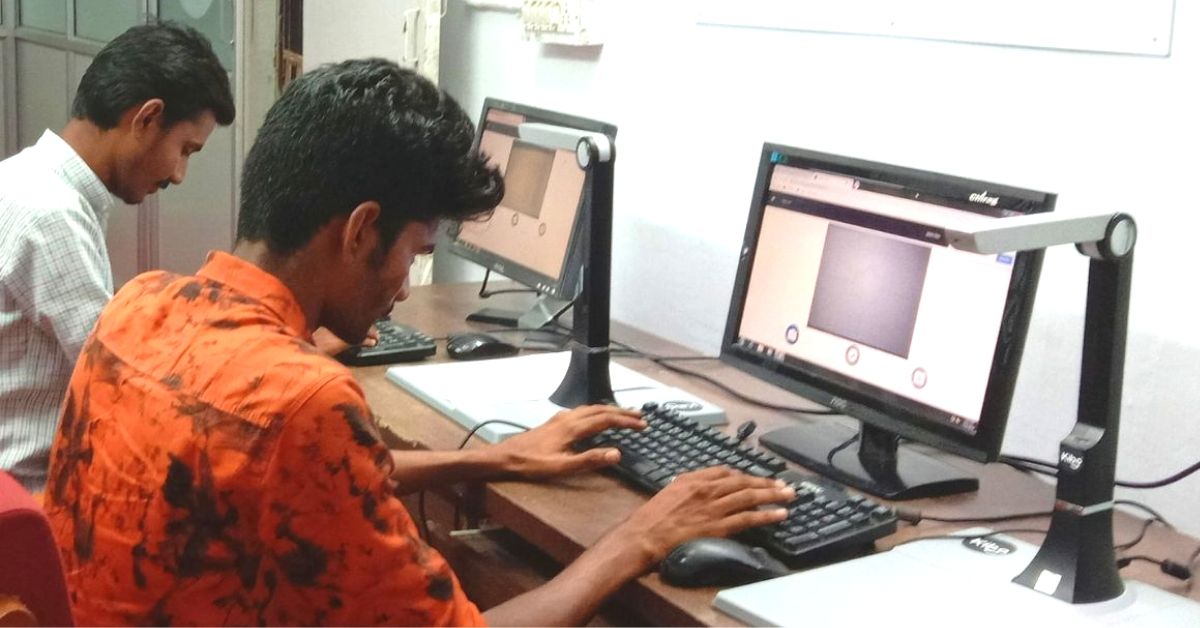
Like everyone, Dipali Pawar from Nashik dreams of becoming financially independent. The third-year Bachelor of Arts student dedicates most of her time to studies, loves gardening, and her favourite pastime is to discuss current affairs.
Dipali, a student of Yashwantrao Chavan Maharashtra Open University, comes across as a regular student, except that being visually-impaired, she has to constantly depend on help while studying and writing her exams.
Many visually-impaired students drop out of school or do not pursue higher education due to lack of learning support. Check out this brilliant device that can scan books, documents and instantly read text in over 100+ languages, here.
In the first year of college, Dipali faced several challenges, the biggest being having to rely on others.
My parents cannot read or write and hence I cannot take their help to study at home. Though the college staff and my friends are extremely supportive, it doesn’t feel right to ask them for help after college hours. Fortunately, I did manage to clear the first year, but I wish I was less dependent on others.
In the second year, Dipali’s wish to rely less on people came true, thanks to a mobile application that translated the text of her books into audio files, “Through the audio files, the self-learning process became very easy. I am confident now, more than ever, to clear my third year,” she says.
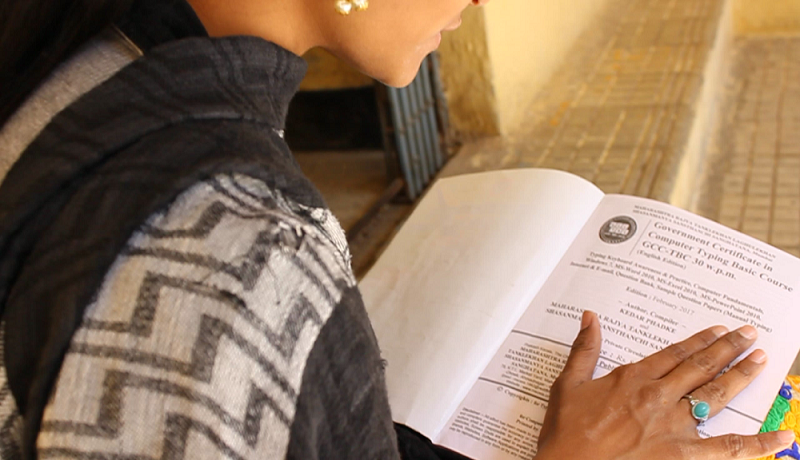
Dipali’s struggles reflect the overall plight of visually-impaired students and students with other disabilities in the pursuit of their academic aspirations. Lack of user-friendly instructions, sensitivity toward the challenges the students face, special educators and teaching facilities are some of the reasons why these students find it difficult to flourish in formal education.
It should then come as no surprise that for children with disabilities, finding an inclusive school is difficult. The available stats pronounce the grim realities of the situation.
“One in every four children with disabilities aged between five and eight never joins any educational institution, as per a report released by UNESCO and the Tata Institute of Social Sciences on 3 July,” says an article published in The Hindu.
The article also quotes from the 2011 census that, of the total 78 lakh children with disabilities aged between 5 and 19, only 61 per cent join an educational institution and that 12 per cent of children with disabilities studying in schools or colleges drop out.
Though the National Education Policy directs schools to provide books with braille and large print, the problem arises when teachers cannot understand braille. Even if students are given writers during examinations and the necessary notes, there is no help for them to prepare for higher or competitive examinations. Lack of education further restricts them from getting employment.
To target these multiple problems that the visually-impaired face, three recent graduates have developed a device and an application that can scan and read aloud printed, handwritten and digital texts. Known as ‘Kibo’, the device and app can also save, copy and share the content. All one has to do is place the text under the device’s scanner to instantly translate the text to over 100+ languages.
On principles of inclusivity and accessibility, Akshita Sachdeva, Bonny Dave and Abhishek Baghel founded Trestle Labs in November 2017. Personal experiences of working with the visually-impaired helped the founders collaborate with each other.
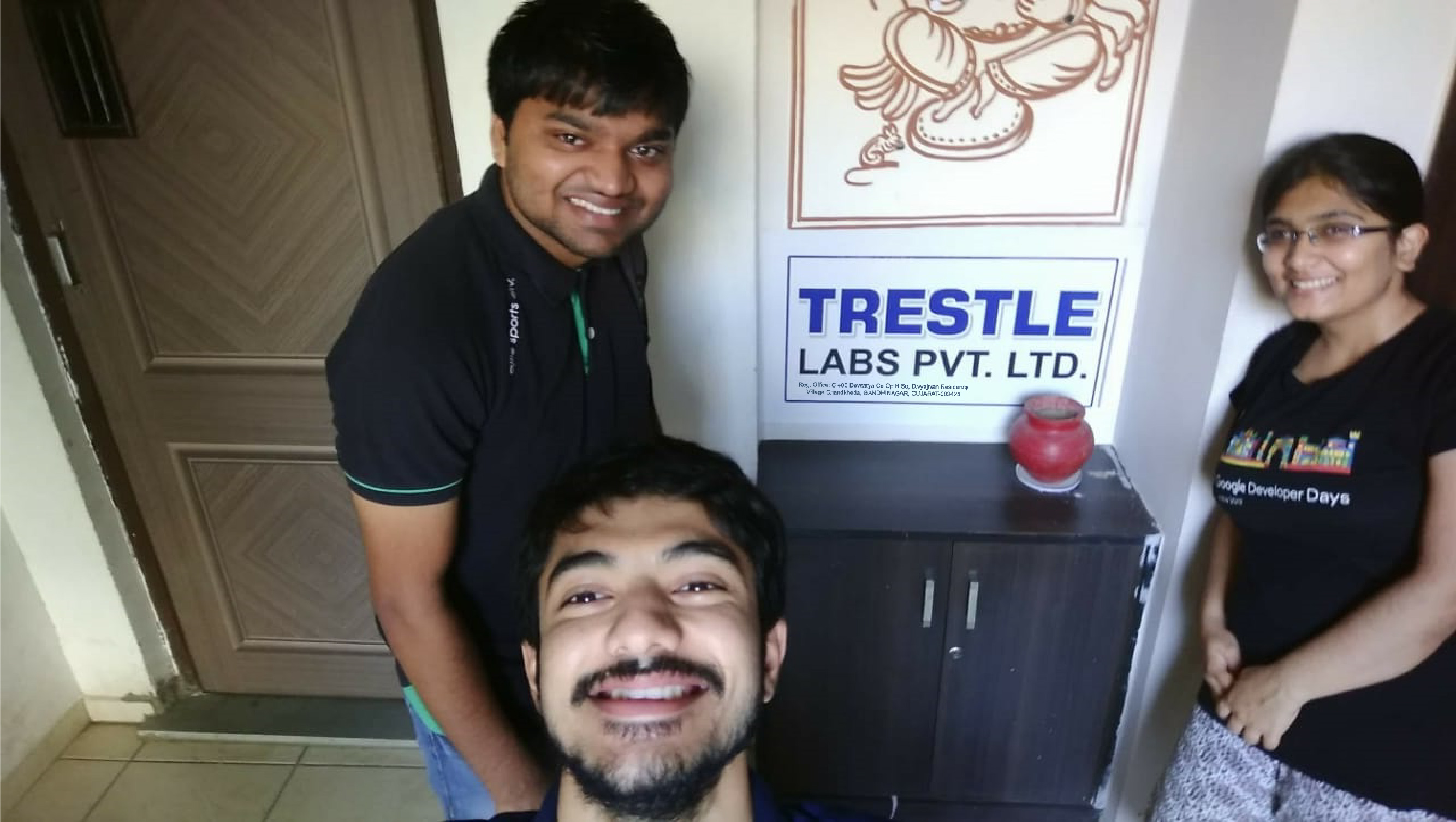
Akshita, a software engineer in Faridabad learnt about the challenges that the visually-impaired face on a daily basis during her final year project. She developed a device for the blind that could help them navigate.
The device would send vibration alerts in case of hurdles on the road to prevent any kind of mishaps, she tells The Better India (TBI). She tested the device on several individuals and it was some feedback that shaped her mission to help people with disabilities.
“A student at the National Association for the Blind (NAB), Delhi had informed his father that he would be travelling alone from Delhi to his hometown in Punjab, using the navigation device. His story made me realise the power of my knowledge and skills to bring a difference in someone’s life.”
For Bonny, it was a volunteering experience with Blind People’s Association in Ahmedabad that motivated him to design a tactile actuator device that he tested at the association. Like Akshita, he also developed a device when he was studying Mechanical Engineering from Nirma University, Ahmedabad.
“The satisfaction of fulfilling someone’s needs pushed me to develop more such solutions instead of taking the conventional path,” he says.
As for Abhishek, a social innovator at IIT Delhi, it was a conversation with a visually-challenged boy on a trip that ignited his curiosity. “After joining DISQ, I met a guy named Akash on a trip, who was preparing for a bank exam and was struggling to study on his own as none of the study material was available in braille. Besides empathy, there was not much that I could offer. At DISQ I teamed up with Bonny who was interested in developing a solution for the visually-impaired,” he tells TBI.
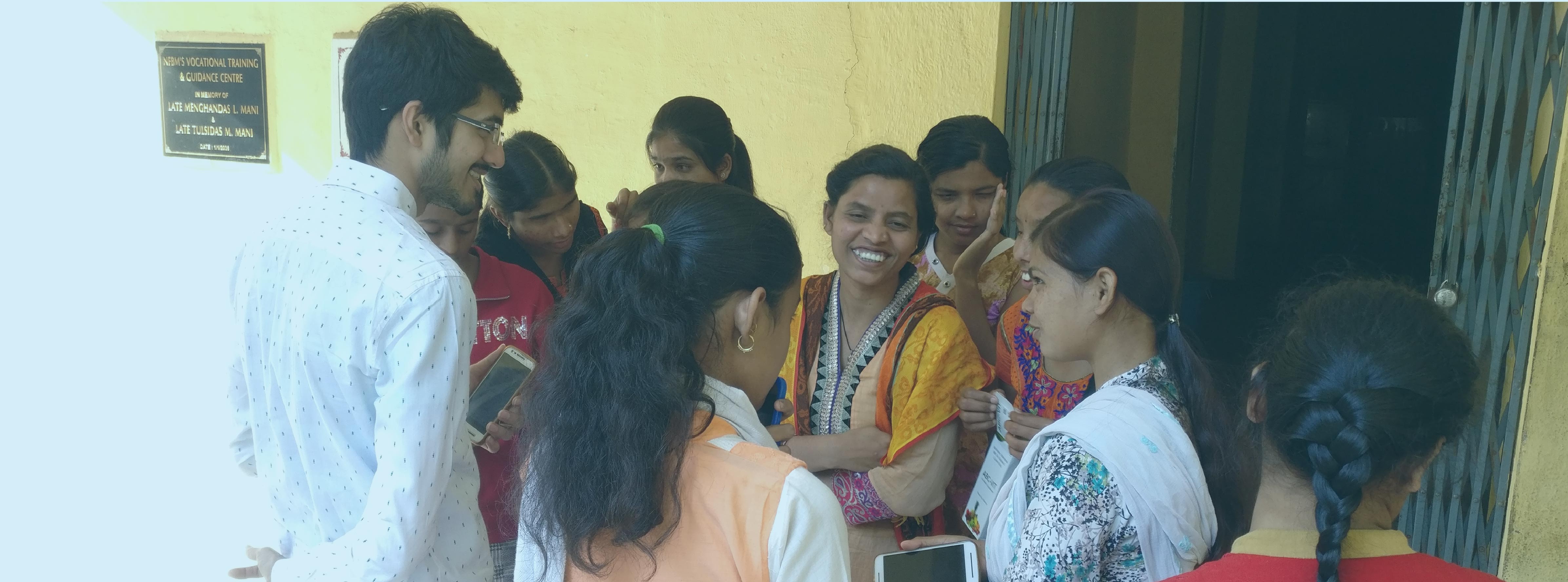
The trio met at Digital Impact Square (DISQ) centre — a TCS Foundation initiative in Nashik to pursue their respective goals after graduation. The pre-incubation centre trains students and fresh graduates to innovate using digital technologies and address social challenges prevalent in society.
Grouped together in one team, they had several device ideas and it was working on-ground that helped them address the topic of education.
“As part of the project, we spent around eight months interacting with the visually-impaired from all age groups across five cities. A lot of our assumptions and doubts were cleared. It was an enriching experience for all of us,” says Abhishek.
A meeting with a blind couple was the trigger point that made them address the issue of content accessibility.
The blind couple’s one-year-old daughter developed rashes on her body after they fed her expired medicine. Something as inaccessible as an expiry date could have put her life in danger, recalls Akshita.
The trio came up with an application named Kibo, which can read a digital book out loud. They also created a device Kibo XS which scans a book placed under its scanner and reads it aloud. The team sent the table-lamp-shaped device to NAB for testing. Both projects were funded by DISQ.
“We received a lot of feedback from our users. One of the biggest criticisms was the device translating only English books. For the next couple of months we worked on integrating several regional languages like Gujarati, Marathi, Bengali, Tamil and Telugu,” says Bonny.
After completing the stint with DISQ, the team participated in many competitions through which they received several grants to scale up and improve the device and the app. Some of the events they participated in were Nasscom Design for India (September 2018), Women Entrepreneurship, DST’s Nidhi Prayas and Empowerment-Pitch hosted by Society for Innovation and Entrepreneurship at IIT-Bombay (March 2019).
Many visually-impaired students drop out of school or do not pursue higher education due to lack of learning support. Check out this brilliant device that can scan books, documents and instantly reads text in over 100+ languages, here.
The team moved their base from Nashik to Bengaluru in November last year, to further scale up the device and the app and added many user-friendly features to them. The team also developed Kibo web-portal to ensure its compatibility with laptops and PCs.
The innovation by Akshita, Abhishek and Bonny and other team members, Appu and Ninad, consists of two parts:
Mobile Application: It caters to printed, handwritten and digital content and can translate 10 regional languages. This is for people with low vision as it requires the user to capture a photo of the document. The app reads out the text from the picture, PDFs and digital books in real-time. Furthermore, the app comes with 8.5 lakh e-books of various subjects like political science, history, science, and math.
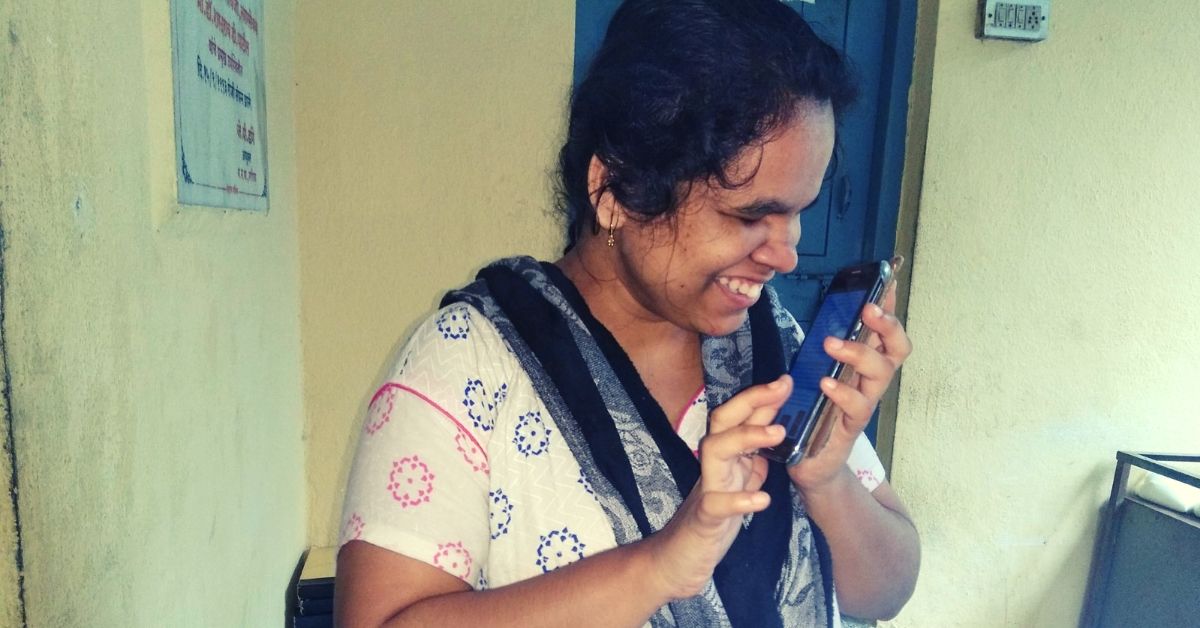
Best Part: The device allows the user to go back and forth in the book, explains the meaning of words, and saves the notes made.
Kibo XS- the Multilingual Scanning and Reading device: The physical product, weighing just 400 grams, is foldable and the user can carry it anywhere. Once the Kibo XS device is connected with Kibo XS mobile app or Kibo Web portal, it can read out printed texts in real-time across multiple Indian and foreign languages. Once you scan the text using the device’s scanner, you have the option to store it in Kibo Cloud to access it any time, anywhere through multi-device access feature.
Best Part: The book scanned can be saved and the user need not scan it again.
Please Note: The mobile application is independent of the Kibo XS device and it can be downloaded from play store for free, here.
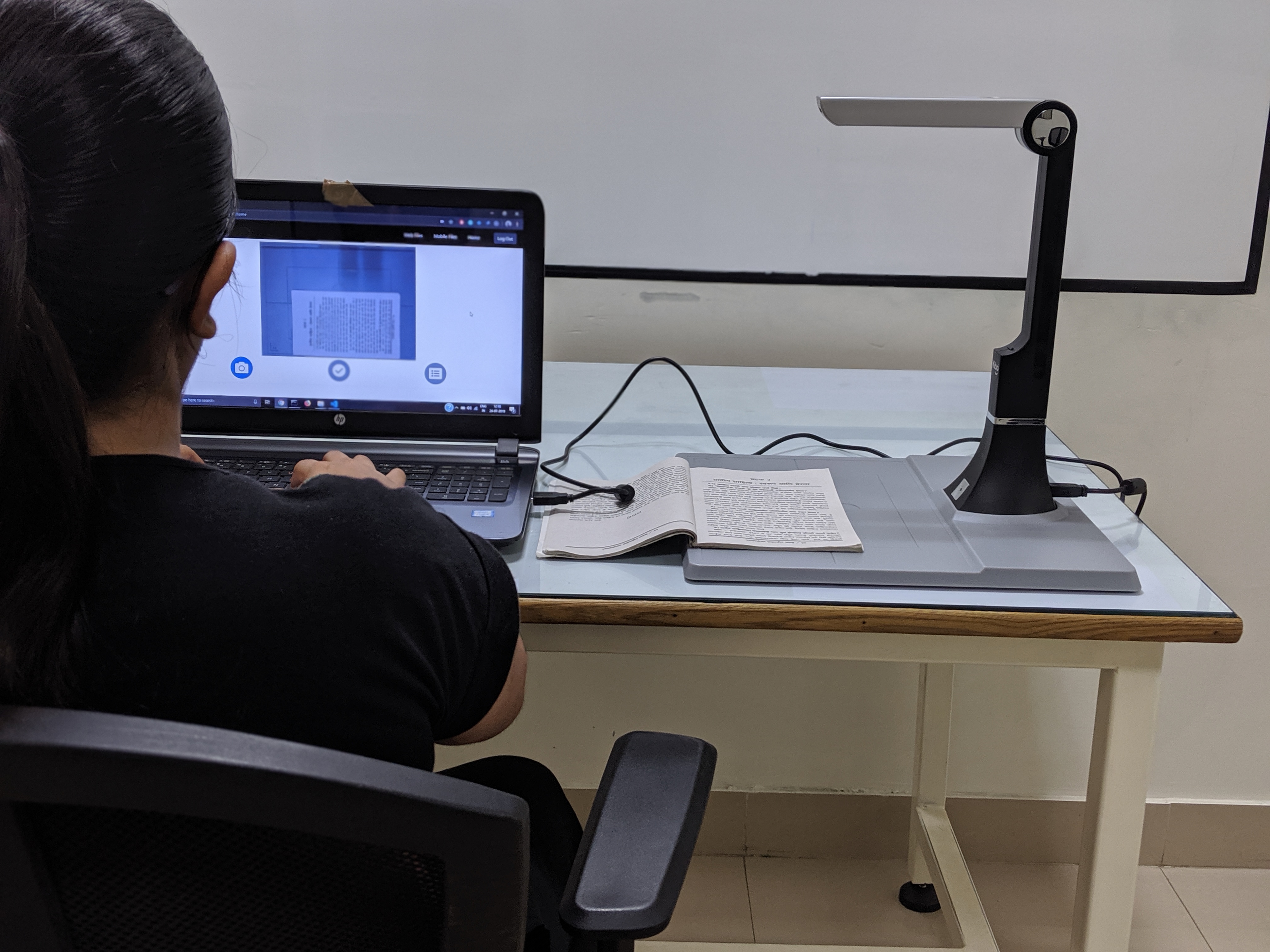
Impact
Kibo, which means hope in Japanese, is an acronym for Knowledge in a Box and has impacted over 2,500 lives. The app has so far been downloaded 2,000 times, and the trio has sold 22 devices. The device costs 1/6th of the price of English-only Readers being imported in India currently.
Trestle Labs, today, has a wide range of clients, from NGOs, libraries, and universities like Indian Institute of Management-Ahmedabad. Their innovation is definitely a concrete solution for hundreds of visually-impaired who aspire to study but are forced to give up their dream due to lack of accessible resources, technical support and infrastructure.
You can order the device here.
Also Read: This Bengaluru Couple Makes Railway Stations Better For The Visually Impaired!
(Edited by Saiqua Sultan)
Like this story? Or have something to share?
Write to us: [email protected]
Connect with us on Facebook and Twitter.
If you found our stories insightful, informative, or even just enjoyable, we invite you to consider making a voluntary payment to support the work we do at The Better India. Your contribution helps us continue producing quality content that educates, inspires, and drives positive change.
Choose one of the payment options below for your contribution-
By paying for the stories you value, you directly contribute to sustaining our efforts focused on making a difference in the world. Together, let’s ensure that impactful stories continue to be told and shared, enriching lives and communities alike.
Thank you for your support. Here are some frequently asked questions you might find helpful to know why you are contributing?


This story made me
-
97
-
121
-
89
-
167













